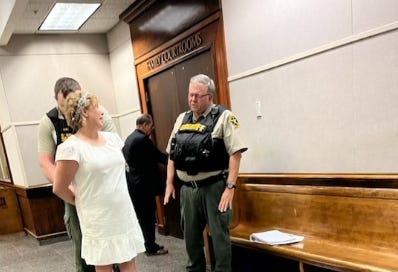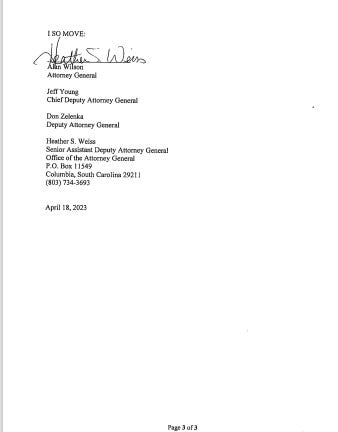Lexington County Paid over $320,000 in Legal Fees to Defend the Unconstitutional Practice of Debtors' Prisons
Attorney General Alan Wilson chose not to opine on this "draconian" practice that ruins lives across the state.

The American Civil Liberties Union (ACLU) and the Terrell Marshall Law Group, PLLC filed a federal lawsuit in 2017 against Lexington County, SC, in which it alleged a two-tiered system of justice for those who were able to pay court fees and those who could not. In its lawsuit, Brown v. Lexington County, the ACLU showed where impoverished persons were being illegally arrested and incarcerated without providing legal counsel or determining that the failure to comply with court orders was actually willful. Historically, the only way for the accused to avoid incarceration was to pay the entire amount of outstanding fees up front and fully — simply not possible for many.
Shortly after the filing by the ACLU, Chief Justice Donald Beatty issued a memorandum stating that it had “continually” come to his attention that SC citizens’ due process rights were being violated. The memo informed judges that this practice was a gross violation of the Sixth and Fourteenth Amendments to the U.S. Constitution, in addition to “numerous opinions” of the Supreme Court of the United States (SCOTUS).
Had the judges forgotten, or had they chosen to legislate from the bench?
Around the same time that Beatty issued this memo, Lexington County rescinded approximately 6,000 warrants and stopped the “debtors’ prison” practice estimated to affect 1,000 Lexington County citizens annually. Even with these concessions by local authorities, the ACLU pressed forward for the next 5 years to help ensure that the county would not return to such illegal debt collection practices. During this time, Lexington County rewarded its legal team with fees totaling $324,238.79 according to Delbert Singleton of the SC State Fiscal Accountability Authority (SFAA).

In 2022, the parties finally reached a settlement that provided for the county to receive funding for 10 new full-time staff (including 6 attorneys) annually to provide the needed legal support to indigent persons unable to pay fines and fees.
Wouldn’t Such a Case Resolve the Practice of Debtors’ Prisons?
NO.
Since Brown v. Lexington County, Gina Bornemann (Richland County) and Rachel Armstrong (Beaufort County) have been jailed for nonpayment of attorneys’ fees. It has previously been estimated that one of every eight incarcerated persons in SC is there for “family court” fees, as detailed in the case of Kershaw County’s Clint Doran.
Countless other parents continued to be threatened daily with incarceration by attorneys, judges, and guardians ad litem (GAL) for the nonpayment of the professional fees incurred during litigation.
Another questionably unconstitutional practice of “family” court judges has been to court order supervisors for parents who have never been found - or even accused - of abuse or neglect. Paying $40-70 hourly to visit one’s own child often creates two separate systems of “justice,” for those parents who can afford it and those who cannot. Parents like Shanda Nicol have expressed amazement - and disappointment - that a judge of sound and sober mind has demanded that she has to be babysat by a well-compensated third party to see her own children.
Distraught parent Brittney Corter has described the unconstitutional treatment of her 10-year-old child at the direction of Judge Bromell-Holmes. In a private custody hearing, her daughter was forced to tour the jail and inspect the bailiff’s handcuffs in a thinly veiled threat if she did not “love everybody.” That young girl was placed in DSS custody early this year because the Court claimed that its preferred and court-ordered counseling had not occurred. Corter’s daughter has now been in a group home for 6 months and like so many others, Brittney questions how this could happen to her family.

Could AG Wilson help rein in kangaroo courts?
Representative Joe White recently asked Attorney General Alan Wilson to issue an opinion around “family” court judges utilizing debtors’ prisons and other practices that may likely violate state/federal rights.
This was the AG Office’s response, effectively saying, “No.”
AG Wilson’s Office specifically claimed, “no authority to direct the judiciary not to exercise its authority,” refusing to review the unconstitutional practices routinely reported in “family” court.
However,
The same AG Wilson, in the highly publicized Jeroid Price case, asserted his right to “assess potential statutory and constitutional violations” in moving the court to unseal Price’s orders for his review. Specifically on page 2, #8 in Indictment 2003-GS-40-2295, this is EXACTLY what he has been asked to do in “family” courts.


Wilson flooded the media to profess his deep commitment to law and order when the misconduct of a retiring judge and SC solicitor Byron Gipson resulted in a national manhunt for the illegally released murderer and gang leader.

Is this Doublespeak by the AG Office?
YES.
For the AG’s office to claim it needs to assess the statutory and constitutional violations in a highly publicized case but then deny it can do the same in “family” courts appears to be a convenient contradiction to his constituents.
Refusing to intervene in the billion-dollar industry that is “family” court allows Wilson to give a nod to donors who depend on the unregulated, anything goes, romper-room type courts that appear to sell children to the preferred parent, i.e., the parent with deeper pockets, the one they find to be the ‘least trouble,’ and/or quietest.
On “X,” (formerly Twitter), AG Wilson definitely appears to enjoy his globe-trotting lifestyle that he claims is largely funded by a campaign fund currently valued at over $634,000. His constituents caught up in the throes of “family” court, however, are literally liquidating their homes, heirloom jewelry, college accounts, even living in their cars, and resorting to food pantries to pay Wilson’s attorney donors.
Litigants of “family” court who are not averse to criminal activity may even resort to extremes like arson for insurance schemes. As explained by Joshua Underwood, Esq., of the Department of Insurance (DOI) in his testimony to the ad hoc committee on insurance fraud this past fall, insurance fraud is simply “easy money.” Per Underwood’s testimony, SLED and DOI are simply just too busy to investigate and prosecute this white-collar crime that costs citizens hundreds annually in inflated premiums; AG Wilson has oversight of the DOI.
Given this recent class action lawsuit and the groundswell of ongoing complaints, should Wilson make an effort to help his constituents who claim to be victims of unconstitutional tactics in SC Courtrooms?
AG Alan Wilson - agwilson@scag.gov






